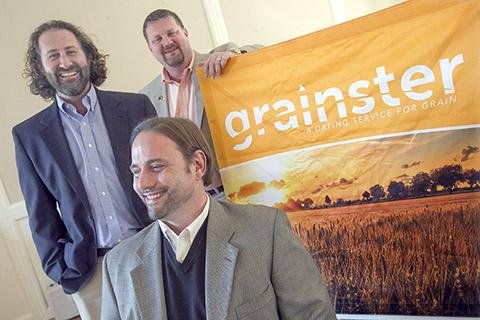Grainster, a Little Rock-based online marketplace for farmers and grain buyers, is kind of like a dating website for both parties, says Layne Fortenberry, the company's founder and chief executive.
On his website, grain is always a common interest and courtship will one day require an examination of financial health.
Long walks on the beach probably aren't relevant.
"You know, we get a kind of giggle from it, but everyone remembers it and it really does describe what we're doing," Fortenberry said. "We're just basically connecting the buyer and the seller directly. It cuts the middleman out. That's what our goal is."
A typical grain sale involves three parties -- a buyer, a farmer and a middleman. The middleman might take the form of a broker, who connects buyers and sellers, or a principal, who might arrange transportation, handle the money and pay appropriate fees.
This arrangement is supposed to ensure security for the farmer. But when Turner Grain Merchandising Inc. of Brinkley -- halfway between Little Rock and Memphis on I-40 -- filed for Chapter 11 bankruptcy protection in October, confidence in the system was shaken deeply. The company left behind millions of dollars of unpaid bills to farmers, grain dealers, trucking companies and other entities.
Arkansas does not require the middlemen to be licensed by the state, insured, audited or bonded. Though the General Assembly may change that this year, those at Grainster believe there are other ways to ensure honest transactions.
Fortenberry thinks that replacing the intermediary with a website that rates grain buyers could be more secure and save money for buyers and sellers.
The matchmaking service, which he said started after the Turner Grain debacle, has already courted 300 to 400 registered users from as far away as India and Rio de Janeiro. The service costs $500 to use for a year.
"Every other area of agriculture has evolved over the last 50 years to make room for technology," said Cotton Rohrscheib, chief technology officer for Grainster and co-founder of Pleth, an interactive marketing agency. "Farmers today trade grain just the same way my granddad did years ago. He sold to the same five buyers within three counties."
Grainster is currently acting much like a Craigslist for grain, with sales negotiations happening by phone calls or emails. But in the next few days, the website will be translated to Spanish, Portuguese, Mandarin and French and negotiations will be handled by a messaging system on the site.
And eventually, Fortenberry said, he will add two key features to ensure the honesty of buyers and sellers.
Grainster will add a score that takes into account day-to-day transactions to rate the safety of doing business with every buyer.
"It allows the farmer to see, for lack of a better word, a credit score of the buyer," Rohrscheib said. "The farmer has a peace of mind knowing if his buyer has a good score."
Grainster also will add a PayPal-like system that holds payments to farmers while the grain is in transit to buyers. This ensures that the buyer has the money to pay for the grain.
If there's a dispute, a third party will arbitrate and Grainster will be able to provide a copy of the negotiations and hold the money until the disagreement is resolved.
"It's kind of like Amazon.com for grain," said Ethan Branscum, assistant director of commodity activities and economics for Arkansas Farm Bureau. "If the buyer has an issue, then Amazon is the one to step in and resolve the issue."
Branscum said Grainster is the first service he had heard of to move grain sales online. He said the service could be valuable to farmers -- especially for courting international buyers who want to purchase directly from the producer -- though some farmers might be uncomfortable using a purely online service.
"Farmers have really embraced technological advancements in terms of farming equipment," Branscum said. "But are farmers -- with the average age of farmers over 58 years old and rising -- going to be comfortable using this?"
Mark Waldrip, one of three principals in Integrity Grain LLC of Moro -- about 15 miles southeast of Brinkley -- said more security is needed for farmers selling grain. He helped start Integrity Grain partly to fill the void created by Turner Grain's absence.
"In the past much of this business was done by someone with really no more investment than a desk and a telephone," he said. "It's not reasonable to expect that type of operation to handle the sale of millions of dollars in grain."
His business will hold a deposit against the grain, which is held before the grain is shipped, to minimize risk to the farmer.
"Many times the troubles occur where a farmer would least expect it," Waldrip said. "I think it's important for a farmer to ask himself the question -- is this someone who is financially responsible and able to handle my transaction if the end purchaser can't make payment? Is this someone I can look to to make me whole?"
SundayMonday Business on 02/09/2015
